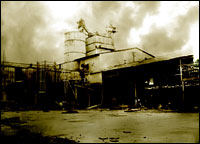Bill McDonough
-
Fast Company publishes an unsparing take-down of green architect William McDonough
This month’s Fast Company has an expose on green architecture guru William McDonough. It is fairly brutal. McDonough’s come in for plenty of hero worship (no small amount of it from me), but as Danielle Sacks tells it, he’s a vainglorious name-dropper and celeb-schmoozer, prone to claiming credit beyond what he is due, devoted above […]
-
‘Eco cities’ easier said than done in today’s China
Remember architect Bill McDonough’s much-ballyhooed "eco-cities" in China? Mara Hvistendahl points to troubling signs that the projects are falling apart.
-
File under: dubious accomplishments
New York Times Magazine manages the somewhat astounding feat of conducting a thoroughly boring interview with Bill McDonough, one of the most interesting people on the planet.
-
John Kerry and Teresa Heinz Kerry chat about their new environmental book
The environment brought them together. And now, together, they’ve brought out a book on the environment. (No flip-flop jokes, please.) John Kerry first met Teresa Heinz at an Earth Day rally in 1990. The two reconnected at the Earth Summit in Rio de Janeiro in 1992, and then, three years later, wed. He continued to […]
-
Newer and cheekier!
With sincere respect to my colleagues across the Atlantic (this is all a matter of opinion, after all), I'm dismayed by some of the choices on their list of most important environmental books. Hoary tomes like The Lorax, an analysis of the impact of pesticides on the environment that's nearly a half-century old (I shake in my boots to criticize La Carson thus) ... if the list were of books that had a big impact in their time, or books that will bolster the sentiments of the already-sympathetic, then it would be enough.
But the "small is beautiful," "earth as organism," "pursue simplicity" approach to eco-reform reflected in most of these choices has not proven a big winner in Western mass culture. Right or wrong, converting Western mass culture is the task at hand today, if we're going to solve the problems addressed by these authors over the decades.
What are the books that speak to more recent science, contemporary events, and our evolving understanding of the intersections of environment with economy, culture, and human rights?
Here are some titles I'd consider:
-
Can industrial civilization really become sustainable? Should it?
To be, or not to be — that is the age-old question, and civilization today faces its own dire version of it. As the negative social and ecological effects of 150 years of industrialization are becoming impossible to ignore, people are asking whether we can maintain our standards of living. But very few are asking […]
-
Cradle to Cradle certification arrives
Ever since I first heard him mention it, I've been wondering when Bill McDonough's "Cradle to Cradle Certification" program was going to become a reality. I think it has huge potential to become for product design what LEED has become for green building (though probably, as Jamais cautions, more slowly and fitfully).
Well, via WC, here it is. The first six recipients have been announced.
Cradle to cradle is a biomimetic approach to design, wherein every material used can either be returned to the earth to biodegrade without harm (a biological nutrient) or can return to the manufacturing cycle with no loss of quality (a technical nutrient). In short: no waste. Or rather, in C2C terminology: waste is food. A great primer on biomimicry can also be found at WC.
The certification ...
... covers five categories (PDF): Materials (including assessment and emissions); Material Reutilization/Design for Environment (including product recovery plans); Energy (including an emphasis on solar energy use); Water (including plans for conservation and quality); and Social Responsibility (including corporate ethics statements and third-party social responsibility assessments). The overview linked above is a basic checklist; the Application Form (PDF) has the full details on what's required for each step of the certification process.
Look for C2C product on shelves near you! Uh, some day.
-
Will hard-won environmental and social gains survive China’s economic rise?
The way China has catapulted itself onto the Monopoly board of global capitalism has caught most Western leaders on the hop. Like Butch Cassidy and the Sundance Kid looking back at their pursuers, top U.S. and European Union businesspeople are wondering, “Who are those guys?” Yuan-a make a deal? After all, how much do we […]
-
Michael Shellenberger for the prosecution
So I'm reading this American Prospect essay by Michael Shellenberger (yes, he of Death fame/infamy) -- which is quite good, but not about anything environmental -- when I stumble across this other essay he did for the same pub, in 2002. It's about Cradle to Cradle author Bill McDonough, and how his politics aren't quite as sophisticated as his design ideas.
I flag it only because it -- particularly the latter half -- makes some good points that serve as a counterbalance to my recent corporate whoredom.
For the seeds of the next industrial revolution to survive and thrive, positive incentives won't be enough. For McDonough's innovations to be broadly adopted by industry he will need to start seeing government regulators and campaigning NGOs as useful allies to prepare the terrain.
